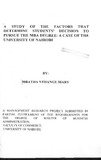| dc.description.abstract | The human resource is generally acclaimed as the most valuable resource. This
is because it is through the human resources that a company can make the most
telling contribution to its competitive edge and ultimately, its bottom - line
profitability and the realisation of its objectives.
Employees can make a difference to the overall success of their organizations
through improving their skills at work. Furthermore, employers find that
management is an important component in their organizations if set objectives
have to be achieved. In an attempt to improve their competence, employees can
aim at obtaining various academic qualifications. The MBA degree is becoming
increasingly recognised as a 'must have' for those aiming at moving up the
corporate ladder.
Of those institutions offering this degree in Kenya, The University of Nairobi
has consistently recorded high enrolments for this degree since it's inception in
1972 and more so, since the introduction of the part -time programme in 1998.
A cursory look at the students registered for the programme shows that they are
.drawn from a wide spectrum of disciplines that are not necessarily business
oriented.
(V)
This is in spite of the fact that the University of Nairobi offers a wide variety of
Postgraduate degrees from which students can choose.
It is these salient features characterizing the MBA degree offered at the
University of Nairobi that prompted this study. The research participant
included students pursuing the MBA degree in both the part - time and full-time
programmes and was aimed at establishing what factors influence students'
decision to pursue the MBA degree.
The research considered both full and part-time students as a homogenous
population of approximately 921 students. Stratified Random Sampling based on
the areas of specialization was used to obtain a proportional representation of the
population. Data was collected using a questionnaire in which a four-point
Likert's Scale ranging from 'Very important' to 'indifferent was used to rank the
key factors under study. Data was analysed by the use of percentages, tables and
charts. Finally, the key factors were condensed by the use of SPSS to determine
the most important factors considered by students in choosing to pursue MBA.
The study found out that the significant factors prompting students to pursue the
MBA degree included personal development, a desire to achieve a personal goal
and to improve their academic qualifications. Other important factors were job
related.
These included development of management skills and abilities, acquiring new
knowledge in an area of specialization, seeking a qualification that would lead to
a promotion in the current job and job security. Lack of employment and the
threat of retrenchment in an increasingly competitive business environment were
yet other reasons that were driving many people back to the classroom to
acquire this important qualification.
On the basis of the finding mentioned, the study reveals a need to conduct
similar studies that would have a much wider scope given that this was a case
study that considered only the University Of Nairobi.
The need to train managers m the key managerial roles cannot be
overemphasized. This is because it IS through their expert guidance that
organizations thrive and grow. | en |

